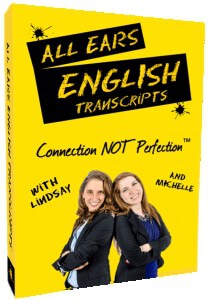Have you heard people use the word “though” in conversation?
Does it ever seem quite different than what you may have used in the classroom?
There are some words that are quite different in a textbook than they are in natural conversation, and “though” is one of them.
We’re going to look at this word, when it would usually fall naturally in conversation, and how to begin to use this on your own.
Get Your Transcripts Today!

Make sure you understand every word you hear on All Ears English.
Bring your English to the advanced level with new vocabulary and natural expressions.
Subscribe and get the transcripts delivered by email.
Learn to speak naturally with the American accent.
Click here to subscribe and save 50%
We have a question from Instagram on the word “though.”
Hello Lindsay and Michelle, hope you are safe!
I have been listening to your podcast for awhile now, and I have a question. I get confused when I hear the word “though.” When should I use it?
Thank you very much,
Mohammed Abodi
The Real Conversational Use of the Word Though
Have you always wondered how to use the word “though?”
In school or textbooks, you likely learned it as a transition sort of word.
It may serve its purpose there, but that’s not how it’s used in actual conversation.
In spoken communication it’s very slangy, and it’s therefore a building block of connection.
You want to be able to use it and use it the right way because it’s common with natives.
You will hear natives use it in a couple of different ways, and so you want to be able to do this yourself.
Situations Where You Would Use Though In Conversation
Since “though” is ultimately has specific uses in conversation, you want to know what those are.
Once you understand the actual situations where you might use this word, then you can try using them in your own conversations.
There are two situations where natives use this word “though” onto the end of sentences.
- We use it a lot when we’re having a conversation with somebody else and we’re trying to make a decision about something. You may be contrasting with another person. Take an example to help you to see how this works in conversation. You may be going camping with people over the weekend and you want to be careful about how many groceries you bring. You could say “If we bring too many things it makes it complicated though.” You are presenting your opinions and being honest with each other. It’s not a bad thing, it’s just helping to get the point across. It is being redundant for a reason. You may even see a sentence that starts with “but” and ends with “though.” This may not be grammatically correct, but it works.
- When we’re talking or thinking out loud and we’re trying to reach a decision as we speak. Here you are thinking out loud or brainstorming which is common. This is also called “spit balling” which means thinking out loud but in perhaps a less refined and maybe even male sort of way. It is all about throwing out ideas in this scenario so that you can come to a conclusion. You could also say “to bounce ideas off of each other” to talk about this situation. While you are in a brainstorming session, you may contradict yourself along the way.
These are the instances where you can expect to use the word “though” naturally in conversation.
Think of the instances where you might use this in your life and then begin to try it out.
Starting To Use This Naturally
This is very natural aspect of English, and a sort of stream of consciousness.
This is not a formal or polished aspect of English, but rather a very natural and native word to use in conversation.
So while you don’t want to ever sound rehearsed, you also want to practice this sort of thing.
Try to narrate your day to talk out loud about what you are doing.
This is taking your day step by step so that you can figure out what you need to do or what you have time.
As you are brainstorming, you might say “I want to make a sandwich for lunch. Oh I don’t have time though!”
This sort of exercise helps you to push your native language out of your brain and almost forces you to speak English.
You can become intimate with the language if you think and speak out loud like this.
Make sure that you dedicate enough time to speaking, learning, and thinking English.
Try to make a plan for yourself so that you make a promise to yourself and your planner that you spend a certain amount of time each day on this.
The word “though” can be a really great one for helping to reiterate something to somebody, or to help you as you brainstorm.
It’s a great word and a wonderful way to connect with natives through proper usage in conversation.
Takeaway
There are some words that may not be pushed much in textbooks, but are a natural part of native conversation.
The word “though” may be taught one way in a classroom, but as you can see it’s used quite differently in conversation.
This is a great word to practice using in the right situations, which you now know firsthand.
If you want to start to speak like the natives, this is an excellent word to experiment with and try out in your conversations.
If you have any questions, please leave them below in the comments section.
We’ll get back to you as soon as we can.








